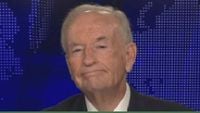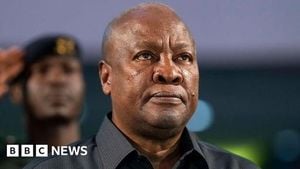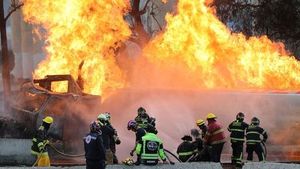On Monday, August 18, 2025, the world watched closely as President Donald Trump and Ukrainian President Volodymyr Zelenskyy met in what was widely described as a high-stakes summit. The meeting, which took place without a hitch according to NewsNation, marked a pivotal moment in the ongoing efforts to address the conflict between Russia and Ukraine. The diplomatic choreography of the day was just the beginning, as attention quickly shifted to Russian President Vladimir Putin, who had met with Trump late the previous week.
With these back-to-back meetings, speculation mounted: Is President Trump positioning himself to take the reins of peace negotiations between Ukraine and Russia? According to NewsNation, Trump announced that plans are already underway for a direct meeting between Zelenskyy and Putin—a potential breakthrough in a war that has dragged on with devastating consequences for both nations.
The situation, however, is fraught with peril. As Bill O’Reilly explained on NewsNation’s "On Balance" program, the path to peace is anything but straightforward. O’Reilly, a longtime political commentator, didn’t mince words when describing the Russian leader’s temperament. "You’re dealing with a person who would kill millions of people," O’Reilly said, referring to Putin. "You’ve got to be very methodical. But the way to get him is that Putin doesn’t want to die. All narcissists are that way. He doesn’t want to die. But if the world, including China, lines up against him and starves Russia, Putin will die. His own army will kill him. That’s what he fears the most."
O’Reilly’s assessment underscores the high-wire act that Trump now faces. The former president—who, according to O’Reilly, was "furious with Putin on his way back from Alaska"—has nonetheless maintained a positive and cordial manner with the Russian leader. The reason for this diplomatic restraint, O’Reilly believes, is clear: to avoid the risk of nuclear war. "He’s not going to make them public," O’Reilly said of the economic sanctions Trump has prepared. "And he shouldn’t. There’s no reason to poke the bear unless you are ready to go, and fight the bear all the way."
Indeed, Trump’s strategy seems to hinge on keeping his cards close to the vest. He has reportedly drawn up a set of very stringent economic sanctions to be imposed on Russia should peace talks collapse. These measures, however, remain shrouded in secrecy—a move O’Reilly supports. The logic is simple: revealing such plans prematurely could escalate tensions and close off avenues for negotiation.
But the stakes are growing higher by the day. On the same Monday as the Trump-Zelenskyy summit, Russia launched rockets against Ukraine, a stark reminder that Putin is unlikely to halt the conflict unless compelled to do so. O’Reilly did not sugarcoat the danger, warning that "Putin is a psychopath. Putin, in my opinion, would use nukes. He’d use them." This chilling assessment reflects the broader anxiety gripping international observers, who worry that the war could spiral out of control if not deftly managed.
Amid these threats, Trump’s next moves are under intense scrutiny. O’Reilly suggested that a "reset" may be in the works on Trump’s end, potentially involving a third meeting or other diplomatic maneuvers. "You try to get this thing under control," O’Reilly said. "But at the same time, you know you might fail. And you have to have a plan B." This candid acknowledgment of the risks involved reveals just how precarious the situation remains.
So what’s at stake here? For Ukraine, the cost of continued conflict is measured in lives lost, cities destroyed, and a nation’s sovereignty under siege. For Russia, international isolation and the threat of internal upheaval loom large. As O’Reilly pointed out, the real danger for Putin may come not from external enemies, but from within his own ranks if the war turns decisively against him. "If the world, including China, lines up against him and starves Russia, Putin will die. His own army will kill him. That’s what he fears the most," O’Reilly reiterated.
This analysis is echoed by many Western analysts, who argue that Putin’s grip on power is more fragile than it appears. The specter of economic collapse and political rebellion has haunted Russian leaders before, and the threat remains as potent as ever. Trump’s use of economic sanctions—kept out of the public eye for now—could be a key lever in this high-stakes game of brinkmanship.
Yet, the risk of miscalculation is ever-present. O’Reilly’s warning that "Putin, in my opinion, would use nukes" is not mere hyperbole. The war in Ukraine has already seen the use of increasingly destructive weaponry, and the world holds its breath at the prospect of further escalation. Trump’s decision to keep negotiations cordial, despite his reported anger toward Putin, reflects a recognition of just how quickly things could spiral out of control.
As Trump seeks to arrange a face-to-face meeting between Zelenskyy and Putin, the international community is left to wonder: Can these efforts deliver a lasting peace, or will the conflict grind on, with all the attendant risks? O’Reilly, for his part, believes that Trump is "doing the correct thing and trying to get this thing settled." Whether that assessment proves prescient remains to be seen.
What is clear is that the coming weeks will be critical. The prospect of a direct meeting between Zelenskyy and Putin—brokered by Trump—offers a glimmer of hope, but also carries significant risks. As O’Reilly noted, "You try to get this thing under control, but at the same time, you know you might fail. And you have to have a plan B." For now, the world waits, watching as the drama unfolds and hoping that cooler heads will prevail.
In the end, the fate of Ukraine—and perhaps the broader security of Europe—hangs in the balance. Trump’s diplomatic gambit, the threat of economic sanctions, and the ever-present danger of nuclear escalation make this one of the most consequential moments in recent memory. The coming days will reveal whether the current strategy can bring about peace, or whether new, even more daunting challenges lie ahead.




